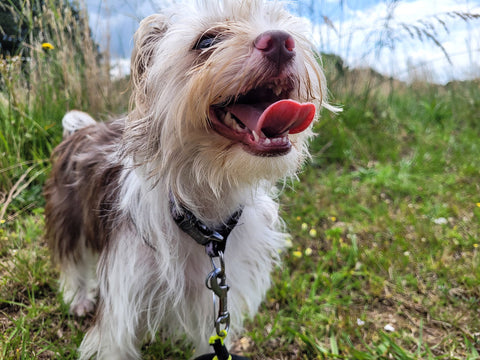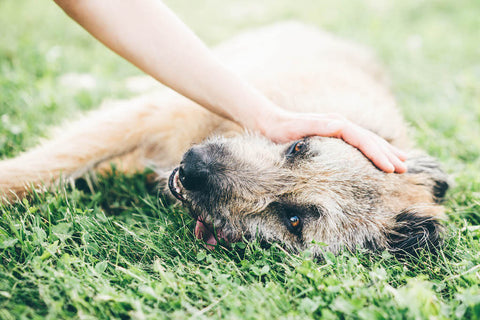Why Is My Dog Panting So Much? Understanding the Reasons
If you've noticed that your dog has been panting excessively, it's essential to pay attention to this behavior as it could be a sign of an underlying issue. While panting is a normal way for dogs to regulate their body temperature, excessive or unusual panting may indicate a problem.
In this article, we will explore various reasons why your dog might be panting excessively and what you can do to help them.
Anxious or Overheated? Why Is Your Dog Panting So Much?

Decoding Dog Panting
Overexertion and Exercise
One common reason for panting in dogs is excessive physical activity. If your dog has had a rigorous play session, a long walk, or strenuous exercise, panting is their way of cooling down. This is generally not a cause for concern, and the panting should subside as your dog rests.
Heat and Humidity
Dogs don't sweat like humans; they primarily regulate their body temperature through panting. High temperatures and humidity can cause dogs to pant more to dissipate heat. It's crucial to provide plenty of water and shade in hot weather to help your dog stay cool.
Stress and Anxiety
Dogs may pant when they're stressed, anxious, or frightened. Common triggers for stress-related panting include thunderstorms, fireworks, or separation anxiety. If you suspect stress is the cause, try to comfort your dog and create a calm environment to reduce their anxiety.
Pain or Discomfort
Panting can be a sign that your dog is in pain or discomfort. If your dog is panting excessively and you can't identify an obvious cause, it may be a good idea to consult with a veterinarian to rule out any medical issues or injuries.
Illness and Medical Conditions
Certain medical conditions can lead to increased panting in dogs. These may include heart disease, respiratory issues, and hormonal imbalances. If your dog's panting seems abnormal and persists, it's crucial to seek professional veterinary advice to rule out any underlying health problems.
Medication Side Effects
Breed-Specific Factors
Certain breeds are prone to heavy panting due to their physiology. Breeds with flat faces (brachycephalic breeds) like Bulldogs and Pugs, for example, may pant more frequently due to their unique airway structures.
Obesity
Being overweight can lead to excessive panting in dogs. The excess weight puts a strain on their cardiovascular system, making it harder for them to breathe efficiently. Maintaining a healthy weight through a balanced diet and regular exercise can help reduce panting associated with obesity.
Allergies
Allergies can also cause dogs to pant excessively. Allergic reactions to pollen, dust, certain foods, or other environmental factors can result in respiratory distress and discomfort. If you suspect allergies are the culprit, consult with your veterinarian for proper diagnosis and treatment.
Infections and Fever
Infections, fever, and inflammation can cause panting in dogs. These conditions increase the body's temperature, leading to panting as a way to cool down. If you notice additional symptoms like lethargy, loss of appetite, or coughing along with panting, consult your vet.
Cushing's Disease
Cushing's disease, or hyperadrenocorticism, is a hormonal disorder that can lead to excessive panting, among other symptoms. It's more common in older dogs and may require specific diagnostic tests to confirm.
Poisoning
Ingesting toxic substances can lead to panting as the body attempts to eliminate the poison. If you suspect your dog has ingested something toxic, contact your veterinarian or an emergency pet poison hotline immediately.
Tips for Addressing Excessive Panting for Your Dog
Monitor your dog's panting patterns. If it's a one-time occurrence related to exercise or heat, there may be no cause for concern. However, if it continues or appears unusual, consult with your veterinarian.
Provide a cool and comfortable environment, especially during hot weather, to help your dog regulate their body temperature.
Reduce stress and anxiety triggers for your dog, and consider consulting a professional dog trainer or behaviorist if needed.
Maintain a healthy weight and ensure your dog gets regular exercise to prevent obesity-related panting.
Always keep your dog's vaccinations up to date, as some illnesses can lead to panting.
If your dog's panting is due to a medical condition, follow your veterinarian's treatment plan and advice for managing the issue.

How to Keep My Dog Cool and Prevent Excessive Panting?
Keeping your dog cool and preventing excessive panting, especially in hot weather, is crucial for their well-being. Here are some tips to help you achieve this:
Provide Ample Fresh Water: Always ensure your dog has access to clean, fresh water. Hydration is essential for regulating body temperature. If you're going for a walk or spending time outdoors, bring water for your dog as well.
Shade and Shelter: If your dog is outside, make sure they have access to shaded areas or a shelter to escape from the sun. A doghouse or a shaded part of your yard can provide relief from the heat.
Avoid Hot Pavement: On hot days, pavement and sidewalks can become scorching, which can burn your dog's paw pads. Walk your dog during cooler times of the day or use booties to protect their paws.
Cooling Mats and Bandanas: Cooling mats and bandanas are designed to help regulate your dog's body temperature. They can be especially useful on hot days. These items can be soaked in water, then placed under or on your dog.
Keep Indoor Temperatures Comfortable: If your dog is indoors, ensure that the temperature is comfortable. Use air conditioning or fans to maintain a cool environment. Avoid leaving your dog in a hot car, as it can quickly become a dangerous situation.
Limit Exercise in the Heat: Avoid strenuous exercise during the hottest parts of the day. Instead, schedule walks and playtime in the early morning or late evening when it's cooler. Be mindful of your dog's energy level and don't overexert them.
Provide a Kiddie Pool: Many dogs enjoy splashing around in a kiddie pool. It's a fun way for them to cool down, especially if they like water. Always supervise your dog around water to ensure their safety.
Grooming: Regular grooming can help keep your dog cool, especially if they have a thick coat. However, be cautious with breeds that have a double coat, as removing too much fur can lead to sunburn. Consult a professional groomer for guidance.
Frozen Treats: Offer your dog frozen treats or ice cubes. You can make ice treats by freezing chicken or beef broth in ice cube trays. This not only helps cool them down but also provides mental stimulation.
Travel Safely: If you're taking your dog on a car trip, make sure the vehicle is well-ventilated, and never leave your dog in a parked car, even with the windows cracked. Cars can quickly become dangerously hot.
Dog-Friendly Sunscreen: If your dog has exposed skin or a short coat, consider dog-friendly sunscreen to protect them from sunburn.
Observe for Signs of Overheating: Be vigilant for signs of overheating, including excessive panting, drooling, rapid heart rate, weakness, and vomiting. If you suspect your dog is overheating, move them to a cooler area and provide water immediately.
Remember that some breeds are more prone to heat-related issues than others, so it's essential to tailor your cooling strategies to your dog's specific needs. Be proactive in keeping your dog cool to prevent excessive panting and, more importantly, to protect them from heat-related illnesses, such as heatstroke.
Leave a comment
